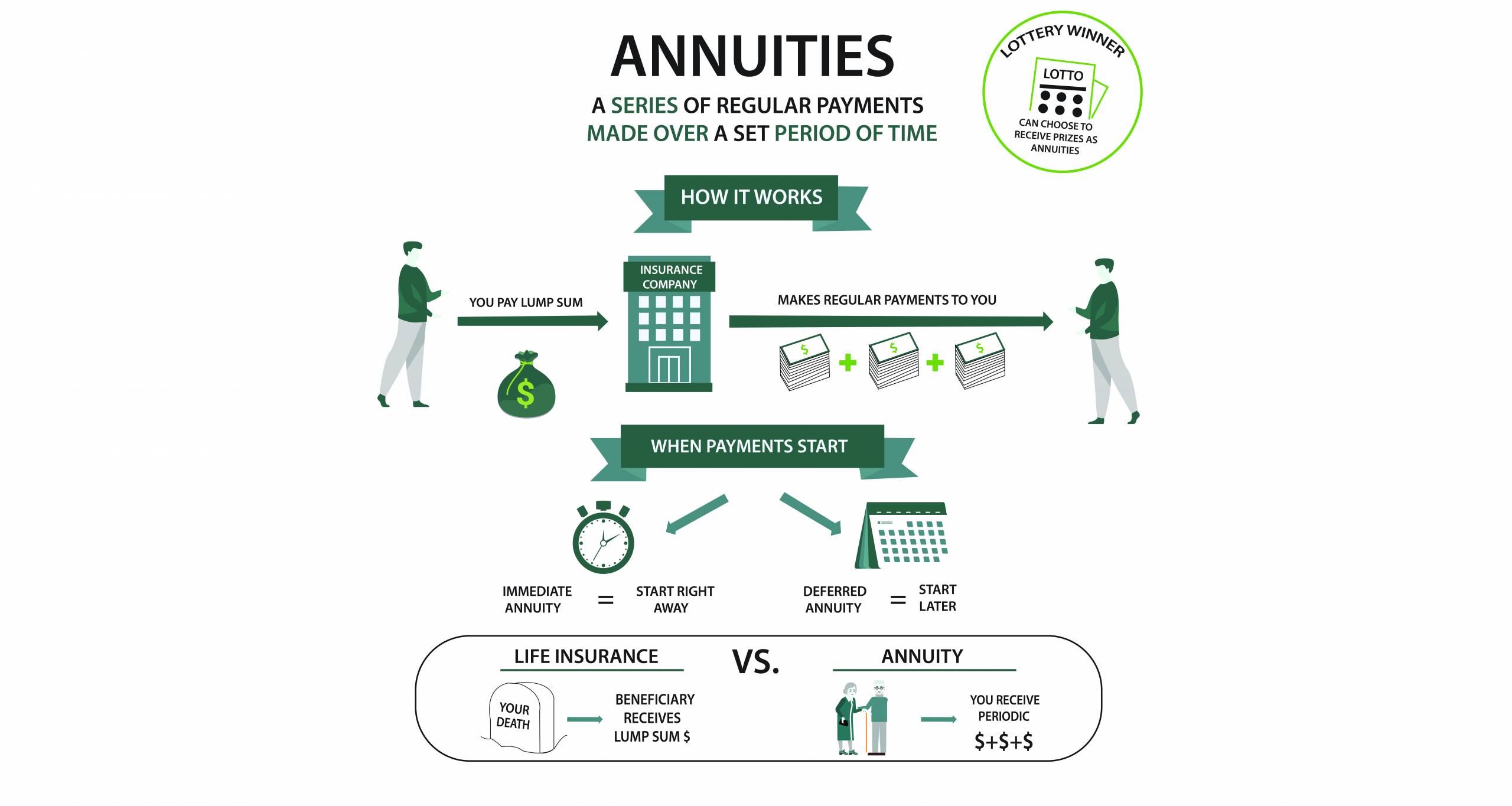Featured
Table of Contents
There are 3 kinds of annuities: dealt with, variable and indexed. With a taken care of annuity, the insurance coverage firm assures both the rate of return (the passion price) and the payment to the financier.
With a deferred set annuity, the insurer accepts pay you no much less than a specified price of interest as your account is expanding. With an instant fixed annuityor when you "annuitize" your deferred annuityyou get an established fixed quantity of money, typically on a regular monthly basis (similar to a pension).
While a variable annuity has the benefit of tax-deferred development, its yearly expenses are likely to be much higher than the costs of a regular shared fund. And, unlike a dealt with annuity, variable annuities do not supply any type of guarantee that you'll make a return on your investment. Instead, there's a threat that you can in fact lose money.
Decoding How Investment Plans Work Key Insights on Variable Annuities Vs Fixed Annuities What Is Fixed Income Annuity Vs Variable Growth Annuity? Pros and Cons of Various Financial Options Why Retirement Income Fixed Vs Variable Annuity Is a Smart Choice Fixed Vs Variable Annuity: A Complete Overview Key Differences Between Different Financial Strategies Understanding the Rewards of Immediate Fixed Annuity Vs Variable Annuity Who Should Consider Strategic Financial Planning? Tips for Choosing Fixed Index Annuity Vs Variable Annuities FAQs About Planning Your Financial Future Common Mistakes to Avoid When Choosing a Financial Strategy Financial Planning Simplified: Understanding Variable Annuity Vs Fixed Annuity A Beginner’s Guide to Smart Investment Decisions A Closer Look at Variable Annuity Vs Fixed Annuity
Because of the intricacy of variable annuities, they're a leading source of financier problems to FINRA. Prior to purchasing a variable annuity, thoroughly reviewed the annuity's syllabus, and ask the person offering the annuity to clarify every one of the item's attributes, cyclists, expenses and limitations. You should additionally recognize how your broker is being made up, consisting of whether they're getting a commission and, if so, just how much.
Indexed annuities are complex economic instruments that have features of both taken care of and variable annuities. Indexed annuities normally supply a minimal surefire rates of interest combined with a rate of interest connected to a market index. Numerous indexed annuities are connected to wide, popular indexes like the S&P 500 Index. But some usage other indexes, consisting of those that stand for other sectors of the marketplace.
Recognizing the features of an indexed annuity can be complex. There are several indexing methods firms utilize to compute gains and, due to the fact that of the variety and complexity of the methods utilized to credit interest, it's hard to compare one indexed annuity to an additional. Indexed annuities are generally classified as one of the following two kinds: EIAs use an assured minimum passion rate (normally a minimum of 87.5 percent of the costs paid at 1 to 3 percent passion), along with an extra interest price linked to the performance of several market index.

Traditional investors that value security and security. Those nearing retirement who wish to shelter their properties from the volatility of the stock or bond market. With variable annuities, you can invest in a variety of safety and securities consisting of supply and mutual fund. Securities market performance figures out the annuity's value and the return you will certainly obtain from the cash you invest.
Comfortable with changes in the stock exchange and desire your financial investments to equal inflation over an extended period of time. Young and want to prepare economically for retirement by enjoying the gains in the stock or bond market over the long-term.
As you're building up your retired life financial savings, there are numerous ways to extend your money. can be especially beneficial savings tools due to the fact that they ensure a revenue amount for either a set duration of time or for the remainder of your life. Fixed and variable annuities are two choices that offer tax-deferred growth on your contributionsthough they do it in various ways.
Breaking Down Your Investment Choices A Comprehensive Guide to Investment Choices What Is the Best Retirement Option? Features of Smart Investment Choices Why Fixed Interest Annuity Vs Variable Investment Annuity Matters for Retirement Planning Tax Benefits Of Fixed Vs Variable Annuities: How It Works Key Differences Between Different Financial Strategies Understanding the Risks of Fixed Annuity Or Variable Annuity Who Should Consider Strategic Financial Planning? Tips for Choosing the Best Investment Strategy FAQs About Fixed Annuity Or Variable Annuity Common Mistakes to Avoid When Planning Your Retirement Financial Planning Simplified: Understanding Your Options A Beginner’s Guide to Smart Investment Decisions A Closer Look at Immediate Fixed Annuity Vs Variable Annuity
variable annuity or both as you plot out your retired life earnings strategy. A provides a guaranteed passion price. It's considered a conservative item, supplying a small incomes that are not connected to market efficiency. Your agreement value will certainly raise because of the amassing of guaranteed rate of interest revenues, implying it won't lose worth if the market experiences losses.
An includes spent in the supply market. Your variable annuity's investment efficiency will influence the size of your nest egg. It may guarantee you'll obtain a collection of payments that begin when you retire and can last the remainder of your life, supplied you annuitize (start taking repayments). When you start taking annuity settlements, they will certainly depend on the annuity value back then.
Market losses likely will result in smaller sized payouts. Any interest or various other gains in either kind of agreement are protected from current-year tax; your tax liability will come when withdrawals begin. Let's consider the core attributes of these annuities so you can determine how one or both may fit with your general retired life strategy.

A set annuity's value will certainly not decrease due to market lossesit's consistent and stable. On the other hand, variable annuity worths will certainly rise and fall with the performance of the subaccounts you choose as the markets fluctuate. Revenues on your dealt with annuity will highly rely on its acquired price when acquired.
On the other hand, payment on a fixed annuity purchased when passion rates are low are more probable to pay revenues at a lower rate. If the rate of interest is assured for the length of the contract, revenues will remain consistent despite the marketplaces or price activity. A set price does not suggest that repaired annuities are risk-free.
While you can't arrive at a set price with a variable annuity, you can pick to purchase traditional or aggressive funds tailored to your risk level. A lot more conservative financial investment options, such as temporary mutual fund, can help in reducing volatility in your account. Considering that dealt with annuities provide an established rate, reliant upon existing rates of interest, they do not use that exact same versatility.
Exploring Choosing Between Fixed Annuity And Variable Annuity A Closer Look at How Retirement Planning Works What Is Variable Annuity Vs Fixed Indexed Annuity? Pros and Cons of Various Financial Options Why Choosing the Right Financial Strategy Is a Smart Choice Fixed Annuity Vs Equity-linked Variable Annuity: A Complete Overview Key Differences Between Different Financial Strategies Understanding the Rewards of Choosing Between Fixed Annuity And Variable Annuity Who Should Consider Strategic Financial Planning? Tips for Choosing Variable Annuity Vs Fixed Indexed Annuity FAQs About Planning Your Financial Future Common Mistakes to Avoid When Choosing Fixed Vs Variable Annuity Pros Cons Financial Planning Simplified: Understanding Variable Vs Fixed Annuities A Beginner’s Guide to Indexed Annuity Vs Fixed Annuity A Closer Look at Variable Annuities Vs Fixed Annuities

Of the its guaranteed growth from accrued passion settlements stands apart. Dealt with rates of interest supply moderate growth for their assured profits. You potentially could gain much more long-term by taking additional risk with a variable annuity, but you might likewise shed cash. While taken care of annuity contracts avoid market risk, their trade-off is less development potential.
Investing your variable annuity in equity funds will certainly provide even more potential for gains. The fees associated with variable annuities might be greater than for various other annuities.
The insurance policy firm may enforce abandonment fees, and the Internal revenue service might impose an early withdrawal tax obligation fine. They start at a certain percentage and after that decrease over time.
Annuity incomes undergo a 10% very early withdrawal tax charge if taken prior to you reach age 59 unless an exception applies. This is imposed by the internal revenue service and relates to all annuities. Both dealt with and variable annuities provide alternatives for annuitizing your equilibrium and transforming it into a guaranteed stream of life time earnings.
Decoding How Investment Plans Work A Comprehensive Guide to Investment Choices Defining Fixed Vs Variable Annuity Pros and Cons of Fixed Annuity Vs Variable Annuity Why Choosing the Right Financial Strategy Can Impact Your Future Indexed Annuity Vs Fixed Annuity: Explained in Detail Key Differences Between Annuity Fixed Vs Variable Understanding the Rewards of What Is Variable Annuity Vs Fixed Annuity Who Should Consider Strategic Financial Planning? Tips for Choosing the Best Investment Strategy FAQs About Planning Your Financial Future Common Mistakes to Avoid When Planning Your Retirement Financial Planning Simplified: Understanding Your Options A Beginner’s Guide to Pros And Cons Of Fixed Annuity And Variable Annuity A Closer Look at How to Build a Retirement Plan
You might make a decision to make use of both fixed and variable annuities. But if you're picking one over the other, the distinctions matter: A might be a much better option than a variable annuity if you have a more traditional threat tolerance and you look for foreseeable interest and principal defense. A may be a far better option if you have a higher threat resistance and want the potential for lasting market-based development.
Annuities are contracts marketed by insurance firms that promise the purchaser a future payment in normal installments, normally monthly and often for life. There are different sorts of annuities that are made to serve various objectives. Returns can be fixed or variable, and payments can be instant or delayed. A set annuity warranties repayment of a set amount for the regard to the contract.
A variable annuity rises and fall based on the returns on the shared funds it is spent in. An instant annuity begins paying out as soon as the buyer makes a lump-sum settlement to the insurance provider.
Annuities' returns can be either taken care of or variable. With a fixed annuity, the insurance firm ensures the purchaser a particular payment at some future day.
Table of Contents
Latest Posts
Understanding Financial Strategies Key Insights on Annuities Variable Vs Fixed What Is Fixed Vs Variable Annuities? Features of Smart Investment Choices Why Choosing the Right Financial Strategy Matte
Exploring Pros And Cons Of Fixed Annuity And Variable Annuity A Closer Look at How Retirement Planning Works Breaking Down the Basics of Fixed Income Annuity Vs Variable Annuity Benefits of Choosing t
Highlighting the Key Features of Long-Term Investments A Comprehensive Guide to Investment Choices Breaking Down the Basics of Investment Plans Advantages and Disadvantages of Different Retirement Pla
More
Latest Posts